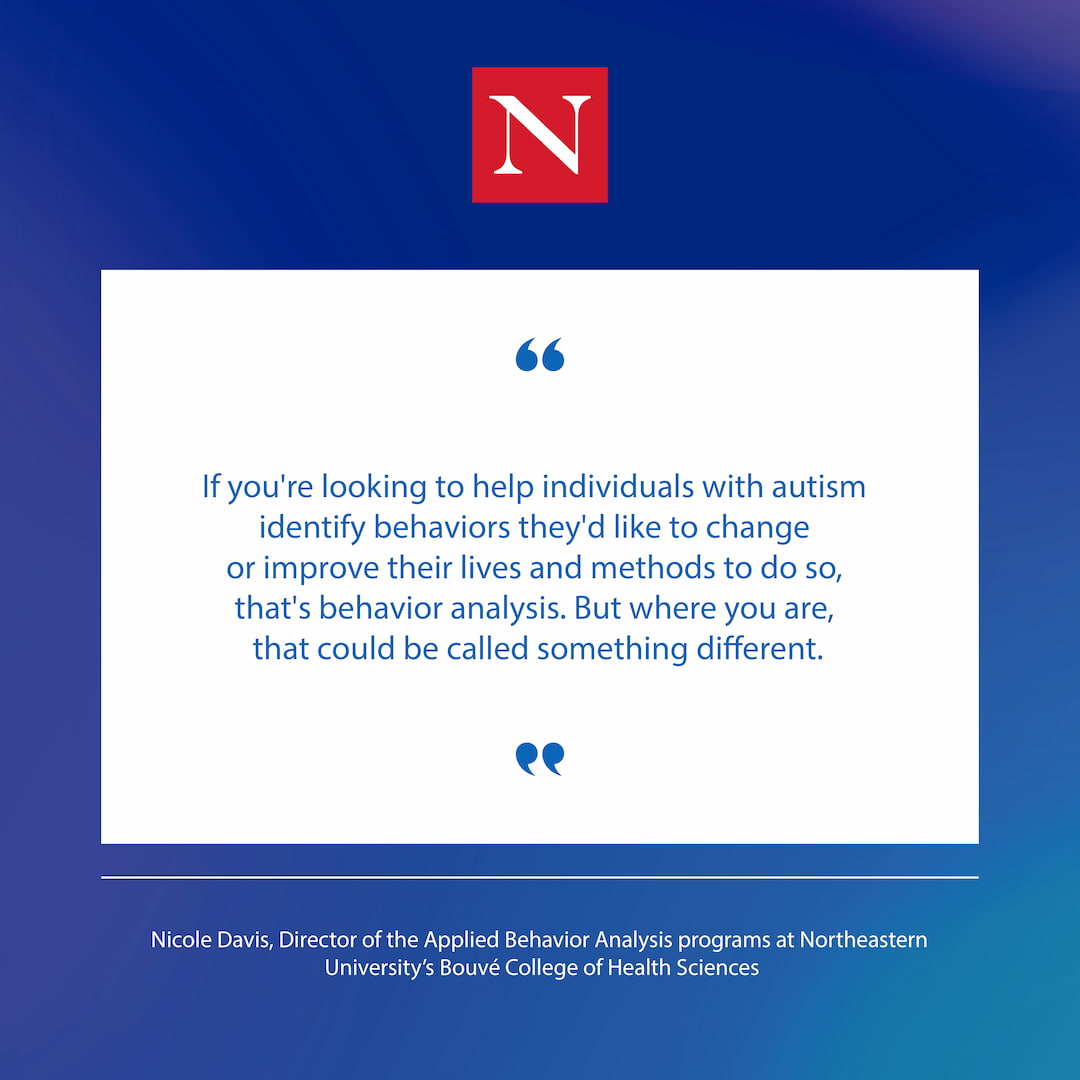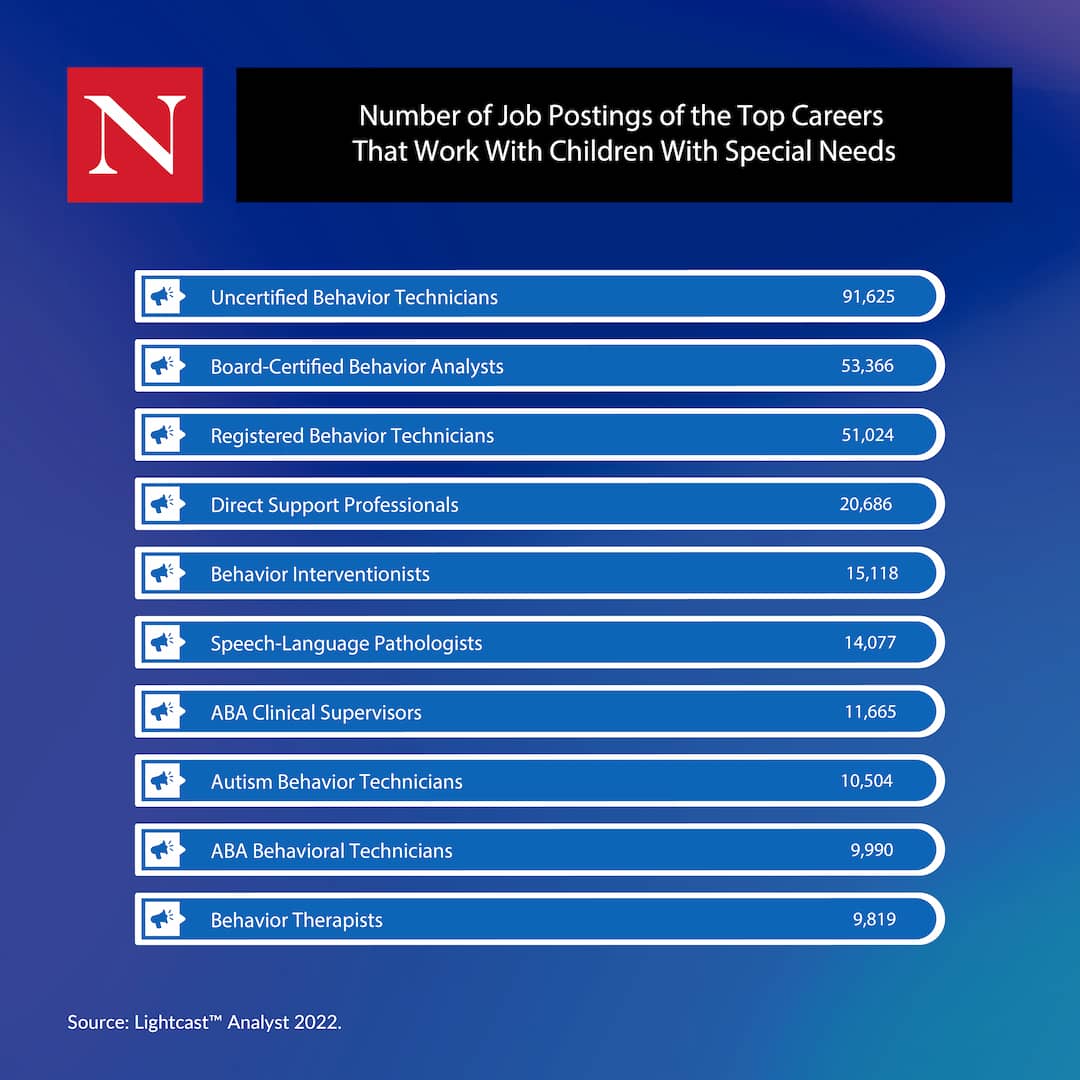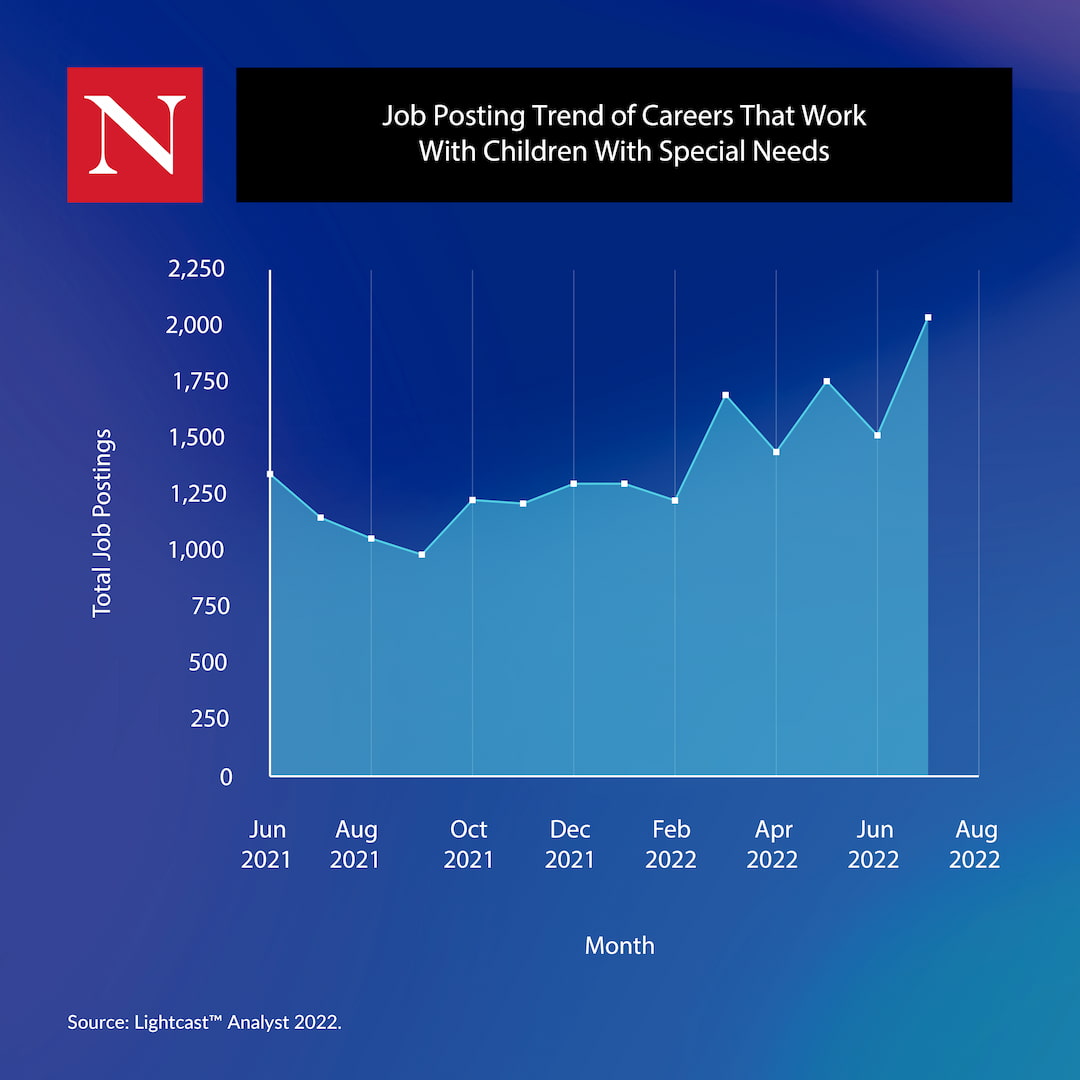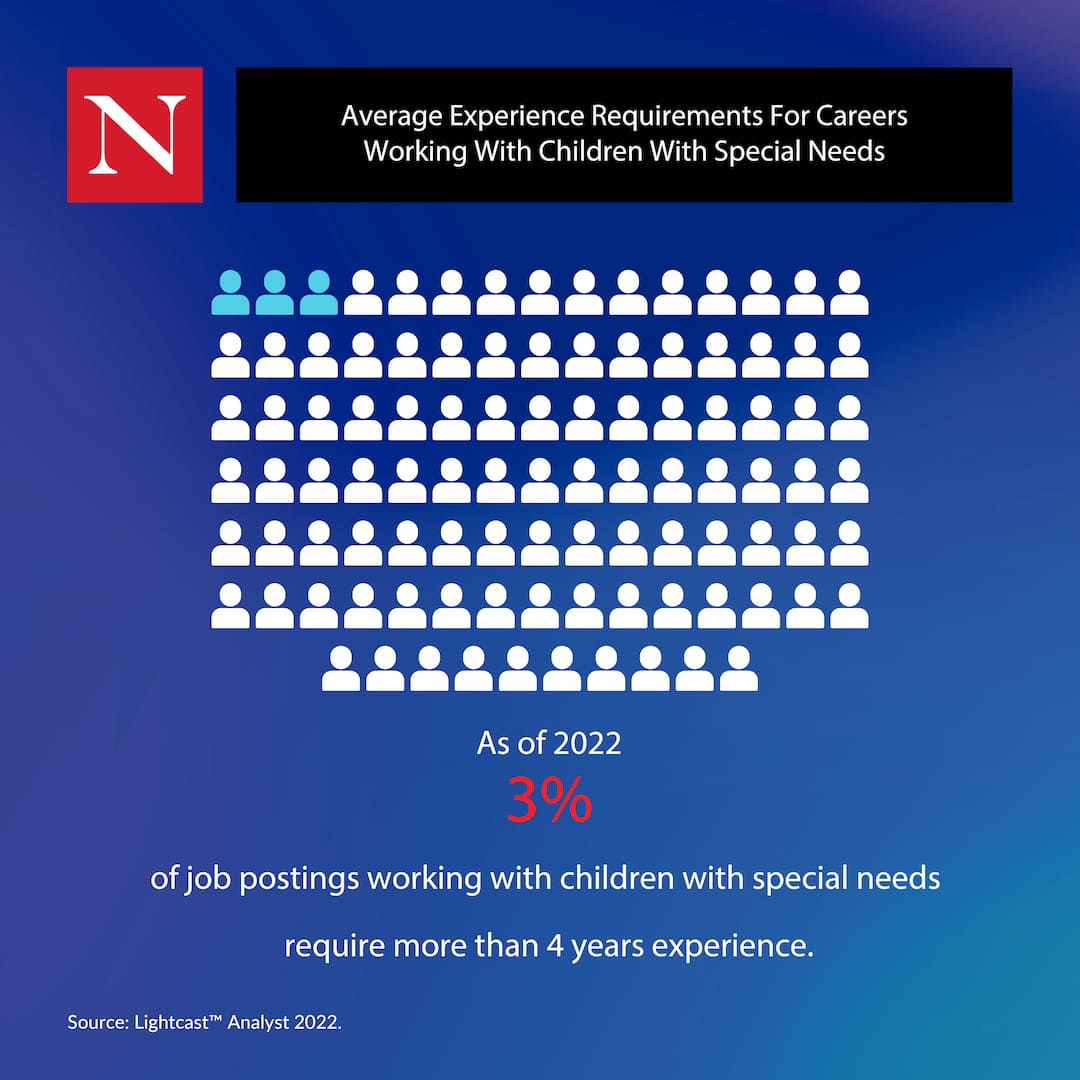There has been a major shift in the number of children diagnosed with a learning or developmental disability. According to the Health Resources and Services Administration, 17 percent of children aged 3–17 years have a developmental disability. And this number has significantly increased over the last two decades.
As a result of this upward trend, more and more resources have been allocated to helping children with special needs. From school settings to clinical practices, psychology professionals are finding ways to help this vulnerable community thrive in their everyday life.
The Lack of Support for Children With Special Needs
In response to increasing diagnoses, parents’ search for adequate care and resources for their children with special needs has become a daunting process. For one, the increase in Board-Certified Behavior Analysts (BCBAs) hasn’t been proportional to the rise in children with special needs. This has widened the ratio of children per supportive professional.
For example, consider the ASD community. Some regions of the United States have a ratio of 17 autistic children per BCBA. While this figure is dependent on the area, the disparity in regions and counties that have significantly less accessibility to these kinds of resources can reach nearly 137 autistic children per BCBA. This inequity of support is widespread and needs more passionate professionals to support the ASD community.
Interested in an Applied Behavior Analysis Career?
Learn how an ABA degree can give you the skills you need to make a difference in the lives of others.
10 Careers That Work With Children With Special Needs
For those interested in helping children struggling with developmental disabilities, it’s important to understand your career options. There are many roles within this field that help children with special needs, but these are perhaps the most rewarding.

It’s important to note, however, that “if you’re looking to help individuals with autism identify behaviors they’d like to change or improve their lives and methods to do so, that’s behavior analysis,” says Nicole Davis, the director of the Applied Behavior Analysis programs at Northeastern University’s Bouvé College of Health Sciences. “But where you are, that could be called something different.”
According to government data, here’s a look at the top career titles for individuals with an aptitude for helping children with special needs.

1. Uncertified Behavior Technicians
Uncertified behavior technicians follow and assist in treatment plans for patients, including children who identify as autistic, created and written by BCBAs. Since these behavior technicians don’t obtain certification, they’re often supervised by BCBAs and registered behavior technicians (RBTs) to ensure client treatments are effective. While uncertified behavior technicians are vocal advocates for the ASD community, without the proper education and certifications, professionals in this role require constant oversight from those who do.
As the most prevalently posted job title, uncertified behavior technician positions are commonly misidentified as the leading career path to help children with special needs. The shift in more certifications and education, however, show that this position offers quick entry to the field with little room to excel your career compared to similar fields. According to the U.S. Bureau of Labor Statistics (BLS), the projected job growth of behavior technicians is 9 percent by 2031.
2. Board-Certified Behavior Analysts
Board-Certified Behavior Analysts are graduate-level, certified professionals in behavior analysis. They try to remediate behavior-related challenges in various environments and communities. One of the most common communities BCBAs support is the autistic community.
Since BCBAs have additional education and certifications, they often supervise people who support children with special needs. BCBAs can act as independent practitioners who provide behavior-analytic services, offering more agency in how they can help their patients. This field is projected to experience an immense amount of growth in the coming years. According to BLS, the job outlook of BCBAs is projected to grow by 22 percent by 2031.
3. Registered Behavior Technicians
Registered Behavior Technicians (RBTs) are paraprofessionals with entry-level certification in behavior analysis. Much like the other roles in this list, BCBAs supervise RBTs in the provision of behavior-analytic services for children who identify as autistic, such as developing social skills and overcoming social challenges.
Since RBTs require low-level certification, this career path offers more opportunities to make a difference in their patients’ lives. However, RBT certification and education aren’t as demanding as what’s expected of BCBAs. As a result, RBT positions don’t have as much growth as BCBAs. The projected job growth of registered behavior technicians is estimated at 9 percent by 2031, according to BLS.
4. Direct Support Professionals
Direct support professionals (DSPs) assist children with special needs in reaching their full potential. While DSPs had originally taken on the role of “caregiver,” recent trends caused this position to evolve into a teaching role, rather than a providing one. As a result, DSPs help those struggling with a disability seamlessly integrate and engage in their community.
Since DSPs are closely related to other careers, like paraprofessionals, it’s difficult to identify what its projected job growth will look like. However, with over 20,000 direct support professional job postings from 2020–2022, there are plenty of opportunities available to anyone who wants to break into the field.
5. Behavior Interventionists
Behavior interventionists (BIs), also referred to as behavior intervention specialists, mainly focus on children’s behavior. These types of professionals work with various individuals to reduce problematic behaviors that often impair the patient’s overall success. Behavior interventionists often work with children with special needs, offering different strategies to decrease disruptive tendencies and teach productive ones.
Since this career path is often grouped with similar titles, the projected job growth is above the national average. According to BLS, behavior interventionists and similar careers are expected to grow by 22 percent by 2031.
6. Speech-Language Pathologists
Speech-language pathologists (SLPs) are part of a very specialized field in the support of children with special needs. They focus on very specific impediments that can affect children with autism, including articulation, stuttering, word finding, semantics, syntax, phonics, vocalization, and swallowing.
Since this is a very specialized field, it requires additional education and licensure compared to some other positions on this list. Although this career path has an excellent projected growth of 21 percent by 2031, the services SLPs offer extend beyond helping children with special needs. There are several other causes of speech-related challenges, such as a brain injury, hearing loss, or stroke. As a result, most SLPs don’t exclusively work with children with special needs.
7. ABA Clinical Supervisors
ABA clinical supervisors administer workplace compliance with behavior-analytic performance standards. Through structured observation, ABA clinical supervisors can provide feedback used to determine whether employees need additional education or training to succeed in their role.
This can be an incredibly rewarding career path for those who want to continually improve and maintain the constantly evolving industry standards in applied behavior analysis. As a result, ABA clinical supervisors are expected to obtain a degree in applied behavior analysis and become a BCBA to ensure they are always up-to-date on all industry standards and regulations in their field.
8. Autism Behavior Technicians
Autism behavior technicians work directly with families with children with autism who are struggling with behavioral challenges. They work in a variety of settings, such as clinics, schools, and even patients’ houses. This is typically dependent on the specific needs of both the child and the family the autism behavior technician is supporting. Similar to a RBT and BT, autism behavior technicians require supervision and oversight of a BCBA. Therefore, this career path shares a similar estimated job growth, projected to grow by 9 percent by 2031.
9. ABA Behavioral Technicians
ABA behavioral technicians provide clinical skills and instruction based on applied behavior analysis principles. They work in various settings in both one-on-one and group sessions with children who identify as autistic. This position is very similar to an RBT in that they implement learning programs under the direct supervision of a BCBA. However, unlike RBTs, people who hold this title have no formal certification in behavior analysis. The estimated job growth is similar to RBTs, which is projected to grow 9 percent by 2031.
10. Behavior Therapists
Behavior therapists assist patients in developing skills and methods needed to overcome problematic behaviors. They focus on creating health behavior patterns to ensure their patients have a happy and productive life. Many behavior therapists work with children with special needs, but often work with patients struggling with mental health challenges and developmental disabilities.
Behavior therapists are part of a growing field in addressing behavioral disorders and mental health counseling. With a projected 22 percent increase in job opportunities by 2031, this is an excellent career option for those who are looking to work with a variety of patients who struggle with behavior patterns.
What to Expect in a Career as a BCBA Helping Children With Special Needs
When working with children with special needs it’s always recommended to expect the unexpected. No two patients and treatment plans are the same, as many children who identify as autistic require different support.
One thing professionals in this field can expect is a highly rewarding career with promising career growth. Here’s an overview of why you should consider this exciting and dynamic career path.
Increasing Job Growth
As mentioned above, the top ten careers helping children with special needs has amazing projected job growth in the coming years. This is great news to those who worry about financial stability.
According to government data, there has been a recent spike in overall job postings that focus on helping children with special needs. At the start of 2022, jobs in this field climbed to 1,307 in January, but July 2022 closed out with over 2,000 postings in 30 days. These promising numbers echo the U.S. Bureau of Labor Statistics’ projection that these careers are on the rise.

It’s important to mention, however, that while many of these roles have high projected growth, careers that require formal certification, like a BCBA, are in higher demand than the careers listed above because of their specialty and expertise. If you want a career path with the highest potential job growth, consider becoming a BCBA.
Rewarding Experience
While there are many career options available to those interested in working with children with special needs, one commonality between all these roles is the desire to help others. BCBAs make a difference in the lives of children who identify as autistic, their families, and the communities they live in.
Shifting Requirements
Interestingly, many of the careers listed above don’t require extensive background experience. In fact, according to government data, nearly 65 percent of these job postings don’t list any specific experience requirements. For those that do, only three percent require more than three years of experience.

This is incredibly promising for those who feel they are unqualified but leaves a rather large gap between positions like a behavior technician and a BCBA, which requires more education, licensure, and experience. As a result, many companies are beginning to shift their job requirements to better align with the evolving needs of children with special needs.
Take the First Step Toward Helping Children With Special Needs
Taking the first step in any career can be challenging, but there are several clearly defined steps you can take to make yourself more marketable in this field. For one, consider studying applied behavior analysis. “ABA is an evidence-based intervention utilized for individuals with autism or if they identify as autistic,” says Davis. In fact, “the large majority of behavior analysts do work with individuals with developmental disabilities.”
With the right education and certification, you can become a BCBA that strives to help children with special needs live happy and fulfilling lives.
Want to learn more about how you can use applied behavior analysis to help children with special needs? Check out Northeastern’s Master of Science in Applied Behavior Analysis to see how you can break into this rewarding field.







Related Articles
4 Pressing Global Health Problems We Face Today
Global Health Careers: How Can I Make a Difference?
Compliance Specialists: Who They Are and What They Earn